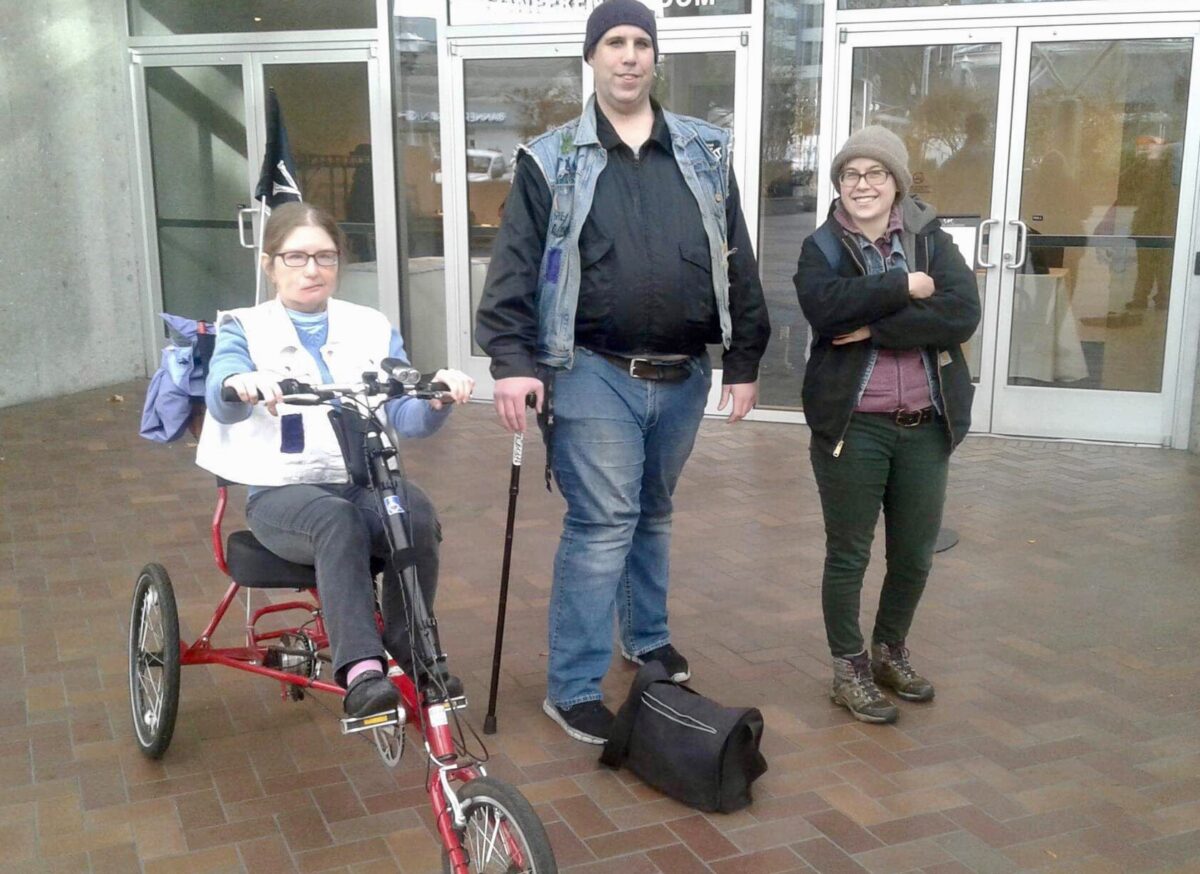
(Photo courtesy Christine Watts)
TriMet General Manager Doug Kelsey and the agency’s Board of Directors heard from two cycling activists during the open public comment period of their meeting yesterday.
“I can’t use public transportation to get to cycling events that I can’t ride to or back from. What do I do? Where is the equity in that?”
— Serenity Ebert
Serenity Ebert rolled up to the microphone on her trike, which she uses as a wheelchair. It’s the same one she pedaled to the stage at the recent Alice Awards dinner where she gave a rousing speech about her experience navigating Portland streets with a physical disability. Christine Watts joined her at the testimony table to ask TriMet to allow tricycles on MAX light rail trains. Both women are members of Civil Unrest Bicycle Club, a grassroots disability advocacy group.
Current TriMet policy does not allow three-wheeled bicycles on MAX. Specifically, the policy states that only, “… two-wheeled bikes, folding bikes, and recumbents the size of a standard bike are allowed… Tandems and bikes with oversized wheels, three or more wheels, trailers or those powered by internal-combustion engines cannot be accommodated. Electric bikes with a sealed battery compartment are permitted.”
Advertisement
“Not allowing such forms of personal transportation on the MAX train creates a hardship, and puts the disabled more at risk of injury, or being a victim of a crime.”
— Christine Watts
Ebert has submitted an application to TriMet for a special exception to the rule, but she says it has been denied. “I’ve lived downtown for 10 years,” Ebert said in her testimony yesterday. “I depend on public transit to navigate the city.” “I use my walker or my trike as my mobility devices,” Ebert continued. “A while ago I was informed that I can’t take my trike on transit as a mobility device. You could argue that I have equal access because I can use my walker on transit. But is it fair or equitable that I can’t use my other mobility device? The one that allows me to more fully participate?”
Ebert explained to Kelsey and the TriMet Board that she needs to be able to use both devices. The walker is slow and difficult to use on its own, and when she’s only using the trike she can’t, “Simply get off and go run to get my walker.” Ebert says if TriMet won’t let her use her trike as a mobility device, she’s still prevented from using it because a bicycle with three wheels is explicitly prohibited in current policy.
“Unlike my fellow non-disabled cyclists, I can’t use public transportation to get to cycling events that I can’t ride to or back from. What do I do?” Serenity asked. “Where is the equity in that?”
In her testimony, Watts said TriMet’s exclusion of adult tricycles and adaptive trikes is discrimination against people with disabilities. “Not allowing such forms of personal transportation on the MAX train creates a hardship, and puts the disabled more at risk of injury, or being a victim of a crime. For example when tricycles are vandalized or parts are stolen or the trike itself when parked at bike racks.”
After their testimony, no one from TriMet spoke or asked questions. You can watch this testimony on video here (starts at 5:00 mark).
In an email today, TriMet public information officer Tim Becker said that while Ms. Ebert did file a “Reasonable Modification Request,” it was denied because, “The requested modification would not be necessary to allow her to fully use or participate in TriMet services, programs, or activities.” Becker said they made that decision based on Ebert’s ability to use a walker. “While Ms. Ebert cannot bring the tricycle on board,” Becker wrote, “she is able to access the transit system using her primary mobility device, which is her walker.” TriMet also says they have no plans to classify trikes as mobility devices, but they will address Reasonable Modification requests on a case-by-case basis.
— Jonathan Maus: (503) 706-8804, @jonathan_maus on Twitter and jonathan@bikeportland.org
Never miss a story. Sign-up for the daily BP Headlines email.
BikePortland needs your support.


